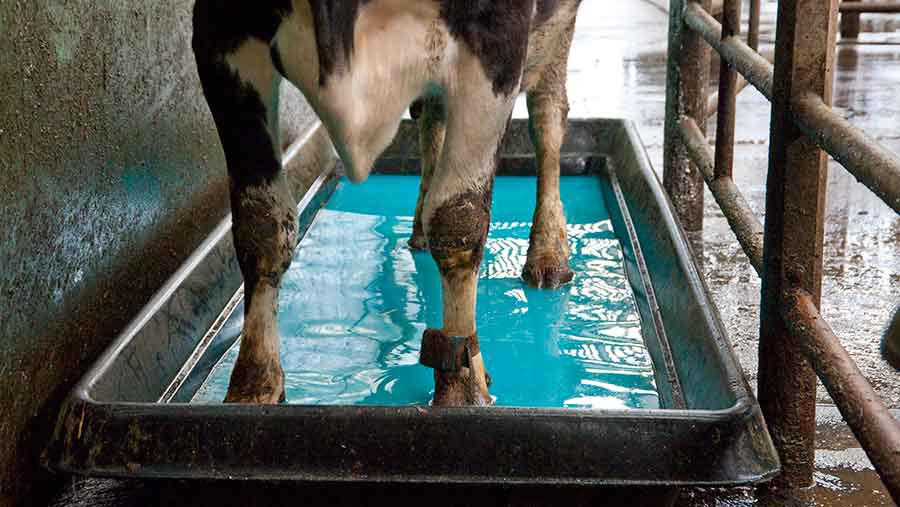Foot-bath now to avoid problems at housing
 © FLPA/REX/Shutterstock
© FLPA/REX/Shutterstock Farmers should not wait until housing to step up foot-bathing protocols or they could face an onslaught of digital dermatitis.
“A lot of people stop foot-bathing over the summer [but] digital dermatitis is still present so you need to start foot-bathing now before you bring your cows in [and they come into contact with slurry],” advised vet John Reader from Synergy Farm Health.
Once cows are housed, moist conditions and slurry in sheds can cause digital dermatitis to “flare up very quickly”, he added.
See also: Mobility scoring as effective as foot-trimming, study finds
Top foot-bathing tips
- Foot-baths should be 3m long so cows get two dunks per foot
- A 28cm step in to the bath will slow cows down and help to increase the number of dunks
- Sheeting the sides of the foot-bath and creating a tunnelling effect improves cow flow
- The rule of thumb for volumes is one litre a cow a pass.
- A 10C increase in temperature at housing increases evaporation threefold. Avoid evaporation by refilling every few days
- Foot-bathing shouldn’t be used to treat severe lesions. Instead, topical antibiotics should be used and bandages should be taken off within a day if used.
To prevent this from happening, Mr Reader said cows at summer grass should be treated once or twice a week prior to housing, starting immediately.
Speaking at the UK Dairy Day 2016 on Wednesday (14 September), Mr Reader told farmers that treatment of foot diseases needed to become more routine, like mastitis prevention, to avoid lesions developing to the acute stages.
“Foot-bathing doesn’t cure digital dermatitis, it halts it and keeps it dormant.”
Formalin
Mr Reader said it was also time for farmers to review their use of formalin.
Formalin has recently been reclassified from a possible carcinogenic product to a probable one and is currently subject to European review.
It can currently still be used providing those using it have professional training and wear protective clothing such as gloves, a mask and goggles.
Mr Reader said he thought farmers would be allowed to continue using formalin but he said sensible use was key.
“It is your responsibility to make sure staff wear it [protective clothing]. If it is going to stay, we need to use it responsibly,”
While there were lots of alternatives on the market that showed good efficacy, Mr Reader said in the future ionised water – which is currently used in the medical industry to treat abscesses and lesions – could be “one to watch out for”.
